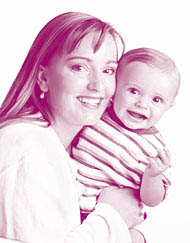Healthy
Start
Now, more than ever, it’s important that you take care of yourself. Not just for your sake, but for your baby’s. Your baby is depending on you for three things: oxygen, nutrition and protection from harmful substances and sexually transmitted diseases. Here are some helpful hints for a healthy pregnancy:
Make an appointment with a health-care provider.
You owe it to yourself and your baby to see a doctor or certified nurse-midwife as soon as possible.
If money is a concern, let the staff at your local pregnancy resource center know and they can inform you of a number of good options – including Medicaid and financial assistance. Many pregnancy centers also offer free “early pregnancy” classes.
Get tested for STDs.
Sexually transmitted diseases can harm an unborn baby if you don’t get treatment. So if there’s
any chance you’ve been exposed to an STD, get tested immediately.
 Stop using harmful substances. Stop using harmful substances.
The most vulnerable time in a baby’s life, health-wise, is in the first few months after conception. Certainly, illicit drugs – and cigarette smoke – should be avoided at all costs. But even moderate amounts of alcohol and many over-the-counter medications can be harmful. Also, consuming too much caffeine has been linked to higher rates of miscarriage and low birth-weight babies. Caffeine also pulls calcium out of your bones and interferes with absorption of iron. If you must have caffeine, limit yourself to the equivalent of one to two cups of coffee
or tea a day.
Get the nutrients you need through good eating habits and a good multivitamin supplement.
At no time in your life is nutrition more important than before and during a pregnancy – and while you are breastfeeding. Not only willpoor nutrition damage your health, but very likely the health
of your unborn baby. Practicing good nutrition from conception onward significantly reduces the risk of certain birth defects, pregnancy complications such as gestational diabetes and a low birth-weight baby. Key nutrients during pregnancy include: folic acid, iron, calcium, zinc, and omega-3 fatty acids.
Call your doctor if…
- You have spotting or bleeding.
- You have constant pain.
- Your water breaks.
- You have symptoms of high blood pressure (swelling in hands/face, blurred vision,
dizziness,
quick weight gain).
- Your baby does not move every waking hour after your 28th week.
Healthy Start information excerpted from Healthy Pregnancy published by Focus on the Family.
|